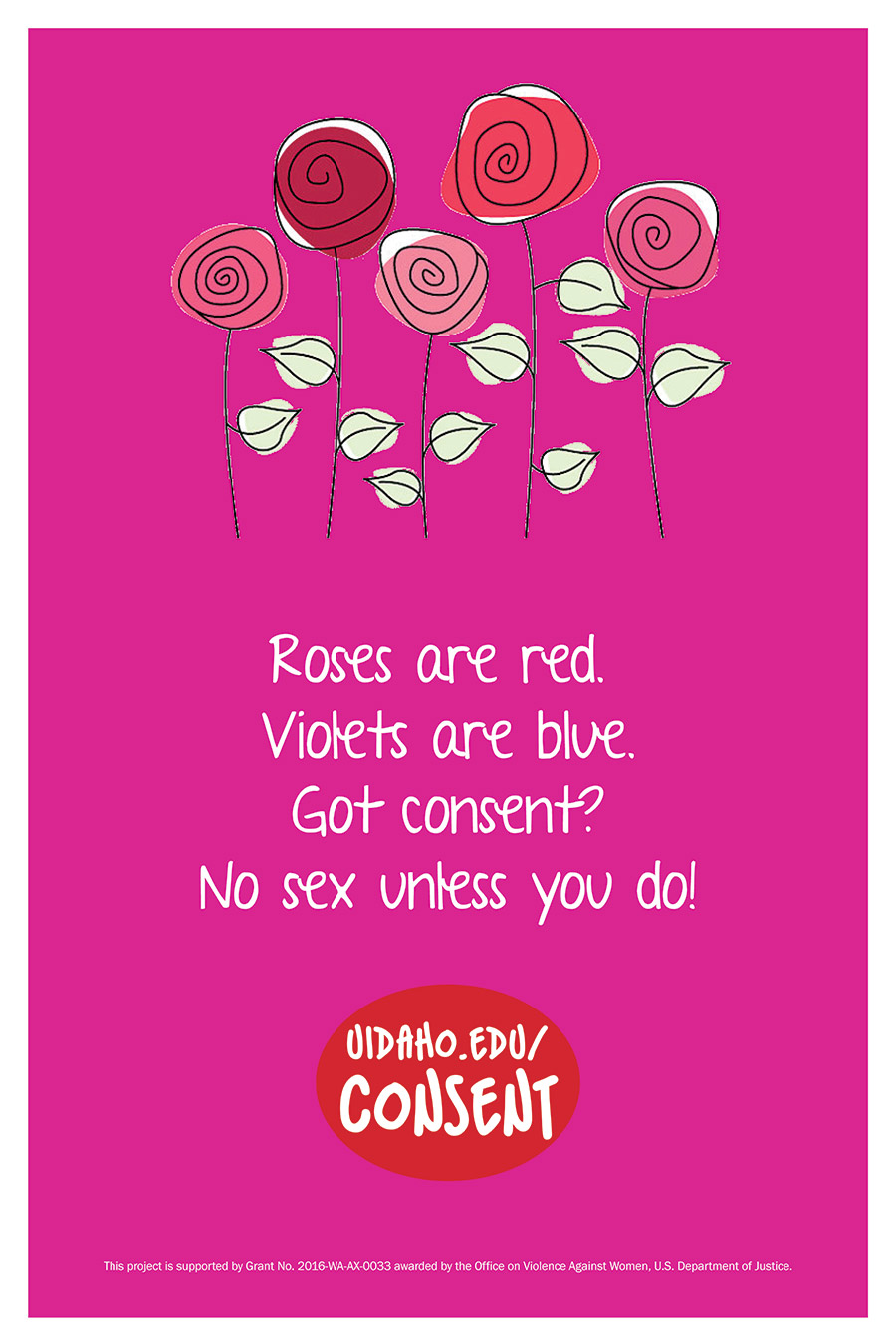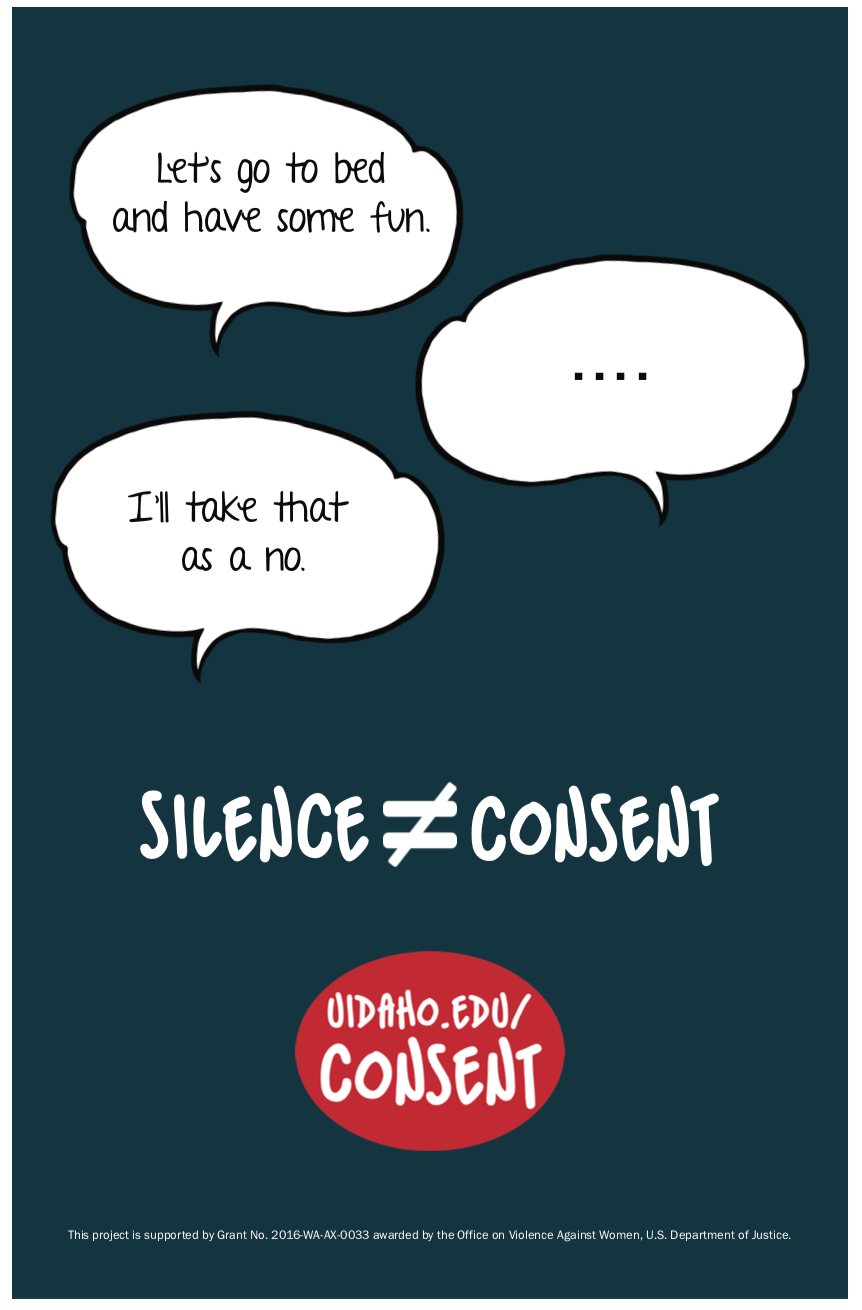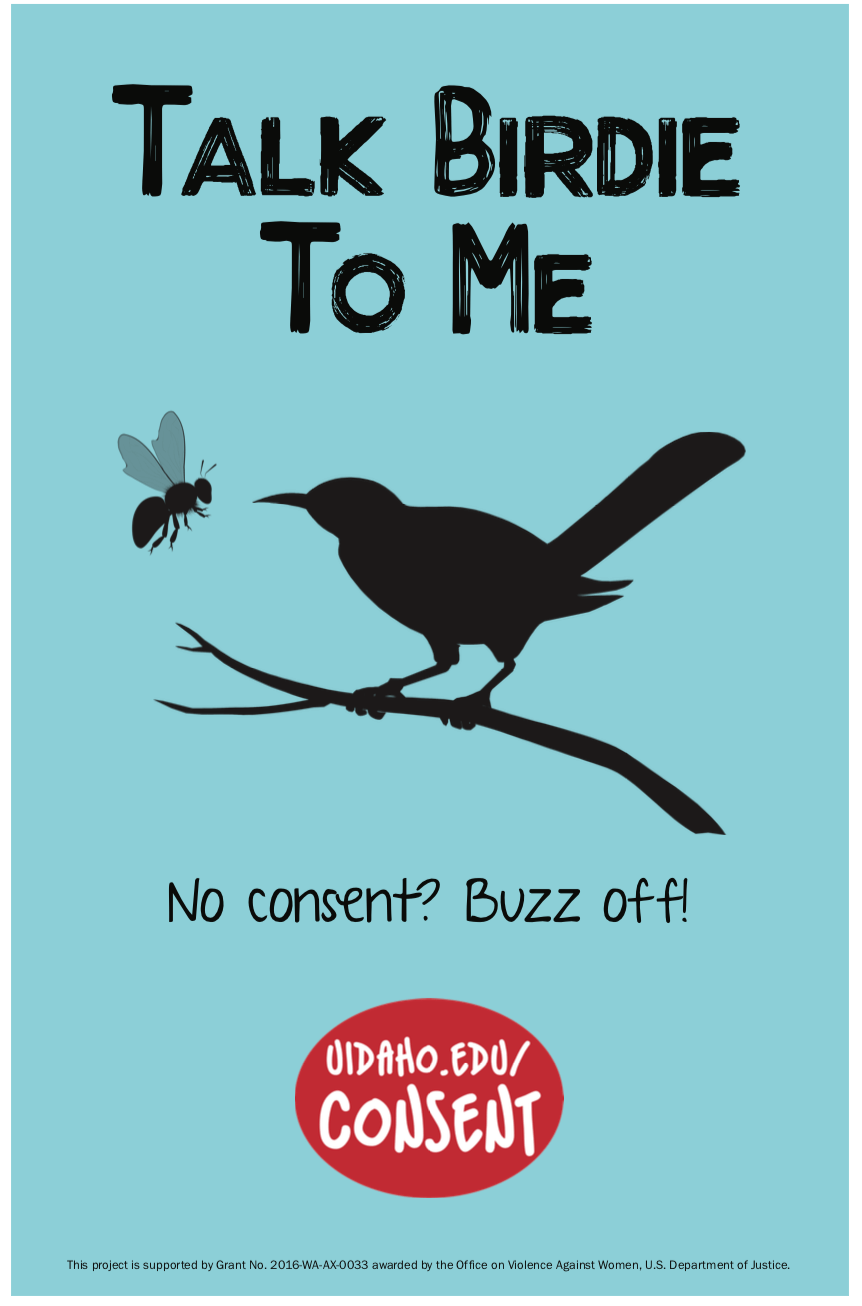Consent
The University of Idaho’s Title IX policy defines consent as “knowing, voluntary, and clear permission by word or action to engage in sexual activity.” Consent may be withdrawn at any time.
It’s your responsibility to get consent from your partner(s) before proceeding with any sexual activity. If consent is not clearly given, be intentional about checking in with your partner(s).
Consent Examples and Resources
While alcohol does not cause sexual assault, it’s a common variable in many campus sexual assaults and is an important factor to consider in relation to consent. Alcohol is often referred to as the most common “date rape drug.” The use of drugs or alcohol can cause impairment that makes an individual unable to give consent in an informed, clear, or coherent manner.
When alcohol is involved, it can be harder for people involved to understand what they are consenting to, they may do or say things that they would not when sober, and they may even be “blacked out” and not be cognizant of their actions or surroundings. If someone is not fully aware of what is going on, they cannot give consent.
The question, “How drunk is too drunk to have sex?” is overly simplistic. A person’s level of intoxication is dependent on many variables—gender, weight, medications, how much they’ve eaten, how much they’ve had to drink, and how quickly they’ve ingested the alcohol. This question also implies that a potential sexual partner is only an object to use for sex, versus an engaged and enthusiastic participant. If you have any doubt about the capacity of a potential partner to consent, wait until you are both sober.
These are a few of the signs that someone is not fully aware and may no longer be able to make informed or clear decisions, including consenting to sexual activity:
- Slurred speech
- Stumbling, swaying, unable to stand
- Slow or delayed reactions
- Glassy, watery or droopy eyes
- Frequent trips to the bathroom
- Vomiting, urinating or defecating on themselves
- Difficulty staying awake
- Being passed out or fading in and out of consciousness
Sometimes individuals who are sexually assaulted while under the influence of alcohol or other drugs hesitate to get help because they are worried about getting in trouble for substance use. The University of Idaho Amnesty Policy and the State of Idaho Medical Amnesty are in place to offset this concern and increase the likelihood students will seek medical attention in crisis situations. Friends or bystanders who may be under the influence, but are actively seeking help for someone else, are included under this policy.
- Consent is an ongoing process. It can be withdrawn at any time during any activity and should always be clearly communicated to your partner(s).
- Consent to some sexual contact does not imply consent to other forms of sexual contact.
- Consent is not automatically present just because you were in or are currently in an intimate relationship with a partner(s).
- Consent can in some instances be given non-verbally (e.g. pulling a partner closer, nodding, active touching, initiating sexual activity).
- Consent cannot occur if a person is incapacitated (i.e., disoriented, unconscious, etc.) and unable to understand what they’re consenting to.
- Consent needs to be freely given. If someone feels pressured into saying yes to an activity, it’s not consent.
Now that you know what consent is, you have to be able to ask for it explicitly and unambiguously. But how do you do that? Although you may worry that asking for consent will be awkward or uncomfortable, it's actually much easier than you might think! Asking permission to do something with your partner(s) shows that you’re into being with them, and that you respect them and their desires. Consent requires good communication. You should check-in with your partner(s) before moving to a new or different sexual activity and wait for their response before proceeding.
- Be direct by naming or describing the act clearly, e.g. “Can I kiss you?”
- Ask your partner(s) what they prefer: “What do you want to do?”
- Ask open-ended questions as a way of starting an ongoing dialogue about what you each want, e.g. “Tell me what you like.
- Create space for your partner(s) to respond.
- Set clear expectations and boundaries beforehand, including desires and limits. Note: these can change at any time during a sexual act or encounter.
- Frequently check in with your partner(s) to make sure you’re on the same page.
- Don't proceed with an activity or pressure your partner(s) if they indicate they don’t want it.
Check out this great video, Consent 101, by sex educator, Laci Green.
- “Do you want to have sex?”
- “Wanna make out?”
- “Is it okay if I touch you here?”
- “Do you like that?”
- “Does that feel good?”
- “How far do you want to go?”
- “Do you want me to...?”
- “Will you do... to me?”
- “Does…. turn you on?”
- “I want to, but...”
- “I’m not sure if I’m ready.”
- “I don’t know if I want to.”
- “I don’t know you well enough.”
- “I think I’ve had too much to drink.”
- “Whoa, this is moving too fast.”
- “I don’t feel right.”
- “I feel sick.”
- “I’m scared.”
- “Please stop.”
- “What would you like to do right now?”
- “Is this okay?”
- “Are you all right?”
- “Do you want to stop?”
- “You seem quiet. Are you sure?”
- “Is there anything you don’t want to do?”
- “Are you comfortable right now?”
- Silence
- Lack of eye contact
- Visible discomfort, squirming, turning away from you
- Tearing up or crying
- Crossing arms or holding arms tight against the body
- Freezing, not responding to you physically
- Pushing you away
- Trying to curl into a ball
- Tense, rigid posture
Counseling and Mental Health Center (on campus) – 208-885-6716
This is one place on campus where confidentiality can be ensured. The information the student shares at the CMHC will not be shared with anyone unless the student potentially poses a harm to her/himself, others or discusses possible child or elder abuse.
Dean of Students Office (on campus) – 208-885-6757
DOS works with students to investigate and adjudicate incidents of sexual violence. They can assist the student in contacting professors regarding academic struggles or provide students with a list of available resources based on the concerns the student may have.
Office of Civil Rights and Investigations (on campus) – 208-885-4285
When someone is ready to report or file a formal complaint of sexual harassment, including sexual assault, OCRI is the office responsible for conducting such investigations.
Vandal Health Clinic (on campus) – 208-885-6693
The VHC is an appropriate referral if an individual seeks medical assistance more than 72 hours after a sexual assault. VHC offers testing for pregnancy, STI’s and other concerns but does not offer sexual assault (“rape kit”) examinations.
Women’s Center (on campus) – 208-885-2777
The Women’s Center is available and accessible to all students and employees, regardless of how they identify. The Women’s Center has trained and confidential staff available to assist individuals in understanding their resources and options.
Alternatives to Violence of the Palouse – 208-883-HELP (4357)
ATVP has a 24-hour crisis hotline. The person/student can speak to or meet with a counselor from ATVP, anytime, day or night. They similarly adhere to a very strict confidentiality oath and can provide the person/student with support during a medical evaluation or provide safety planning options when necessary. They will send someone to meet with the student on campus 24/7. They advocate for the student’s interests/rights.
Moscow Police Department – 208-882-COPS (2677)
The person/student has the right not to report this information to the police but MPD can assist with safety planning options and will give the person/student as much control as possible during the criminal investigation process, up to a certain point.
Gritman Medical Center – 208-882-4511
GMC is the appropriate referral if an individual is seeking immediate medical assistance (or within 72 hours of a sexual assault) or after-hours care. Additionally, GMC is the recommended medical facility in Moscow if an individual would like to complete a rape kit examination by a specially trained nurse.
Rape, Abuse and Incest National Network – 800-656-HOPE (4673)
If an individual is concerned about anonymity, RAINN is one of several national organizations that offer crisis hotlines.
















